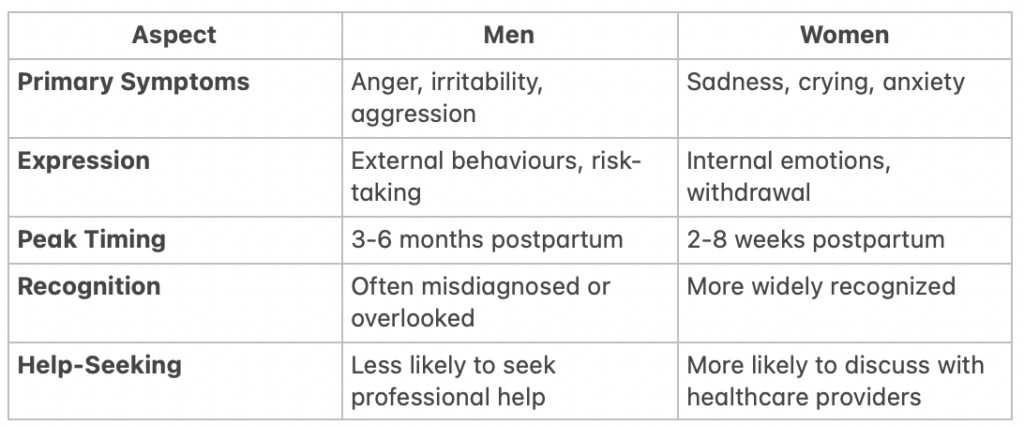When we think about postpartum depression, our minds typically jump to new mothers struggling with overwhelming emotions after childbirth. However, a growing body of research reveals a crucial truth: postpartum depression in men is not only real but surprisingly common.
What Is Postpartum Depression in Men?
Postpartum depression in men, also called paternal postpartum depression or paternal postnatal depression, is a form of depression that affects fathers during the first year after their child’s birth. This condition mirrors many symptoms seen in maternal postpartum depression but often presents differently in men.
Unlike the baby blues that many new parents experience for a few days or weeks, paternal postpartum depression is a serious mental health condition requiring professional attention and support.
How Common Is Postpartum Depression in Fathers?
The statistics might surprise you:
- 1 in 10 new fathers experience postpartum depression
- Up to 25% of men may experience some form of paternal depression during their partner’s pregnancy or after birth
- 50% of men whose partners have postpartum depression are at increased risk of developing it themselves
These numbers highlight that paternal mental health deserves the same attention and care as maternal mental health.
When Does Postpartum Depression Peak in Men?
The timeline for postpartum depression in men differs from women:
- Women: Symptoms typically appear within the first few weeks after birth
- Men: Peak symptoms occur 3-6 months after birth
- Some fathers may experience symptoms even during pregnancy, particularly in the first trimester
This delayed onset often means paternal postpartum depression goes unrecognized and untreated for longer periods.
Signs and Symptoms of Postpartum Depression in Men
Recognizing postpartum depression in men can be challenging because symptoms often differ from those typically associated with depression in women.
Emotional Symptoms
- Persistent sadness or emptiness
- Feelings of guilt, shame, or inadequacy as a father
- Loss of interest in activities once enjoyed
- Anxiety about the baby’s health or development
- Feeling disconnected from the baby or partner
Behavioral Changes
- Anger and irritability (more common in men than sadness)
- Aggressive or violent behavior
- Risk-taking or impulsive behaviors
- Social withdrawal from family and friends
- Increased alcohol or substance use
- Working excessively to avoid home responsibilities
Physical Symptoms
- Chronic headaches
- Digestive problems
- Muscle aches and tension
- Sleep disturbances (beyond normal newborn-related sleep loss)
- Changes in appetite
- Fatigue and low energy
- Poor concentration and decision-making
What Causes Postpartum Depression in Men?
Several factors contribute to the development of postpartum depression in fathers:
Hormonal Changes
Research shows that men experience hormonal fluctuations during their partner’s pregnancy and after birth:
- Decreased testosterone levels
- Increased estrogen and prolactin
- Elevated cortisol (stress hormone)
These hormonal shifts can significantly impact mood and emotional regulation.
Sleep Deprivation
The cumulative effect of sleep loss can severely impact mental health:
- Disrupted sleep patterns
- Reduced REM sleep quality
- Chronic fatigue affecting cognitive function
Relationship Stress
New parenthood brings significant relationship challenges:
- Changes in intimacy and communication with partner
- Feeling like the “second parent” or less important
- Financial pressure and responsibility
- Loss of couple time and independence
Role Adjustment
Becoming a father involves major life transitions:
- Identity shift from partner to parent
- Increased responsibility and pressure to provide
- Fear of not being a good father
- Lack of preparation for fatherhood compared to mothers
Risk Factors for Paternal Postpartum Depression
Certain factors increase a man’s likelihood of developing postpartum depression:
Personal History
- Previous episodes of depression or anxiety
- Family history of mental health conditions
- Substance abuse history
- Poor coping mechanisms for stress
Relationship Factors
- Partner with postpartum depression (significantly increases risk)
- Relationship conflicts or instability
- Lack of support from partner
- Communication difficulties
External Stressors
- Financial difficulties
- Job instability or work stress
- Social isolation
- Lack of family or friend support
- Unplanned pregnancy
Birth-Related Factors
- Complicated pregnancy or delivery
- Premature birth or baby health issues
- Multiple births (twins, triplets)
- Fertility struggles or previous pregnancy loss
How Is Postpartum Depression in Men Different from Women?
While both men and women can experience postpartum depression, there are notable differences:

Frequently Asked Questions About Postpartum Depression in Men
Can fathers get postpartum depression even if the mother doesn’t have it?
Yes, fathers can develop postpartum depression independently of their partner’s mental health status. While having a partner with postpartum depression increases risk, it’s not a requirement for paternal depression to occur.
How long does postpartum depression last in men?
Without treatment, paternal postpartum depression can last anywhere from several months to over a year. With proper treatment, symptoms typically improve within 3-6 months.
Is postpartum depression in men the same as regular depression?
While the symptoms may overlap with general depression, postpartum depression in men is specifically related to the transition to fatherhood and often includes unique stressors related to parenting, relationship changes, and role adjustments.
Can postpartum depression in fathers affect the baby?
Yes, paternal postpartum depression can impact:
- Father-child bonding
- Child’s emotional and behavioral development
- Family dynamics and stability
- Partner’s mental health and recovery
Treatment Options for Postpartum Depression in Men
Professional Treatment
Therapy Options:
- Cognitive Behavioral Therapy (CBT)
- Interpersonal therapy
- Support groups specifically for new fathers
- Couples therapy to address relationship issues
Medication:
- Antidepressants may be prescribed in severe cases
- Consultation with psychiatrist familiar with postpartum issues
- Careful monitoring of medication effects
Self-Care Strategies
Physical Wellness:
- Regular exercise and physical activity
- Maintaining healthy sleep habits when possible
- Proper nutrition and limiting alcohol
- Stress reduction techniques
Emotional Support:
- Connecting with other new fathers
- Open communication with partner
- Seeking support from family and friends
- Professional counseling or therapy
Practical Steps:
- Sharing childcare responsibilities
- Taking breaks when needed
- Maintaining some personal interests and hobbies
- Setting realistic expectations for adjustment period
The Importance of Male Mental Health Support
Addressing postpartum depression in men requires breaking down stigma around male mental health. Men often face barriers to seeking help:
- Cultural expectations to be strong and stoic
- Lack of awareness that men can experience postpartum depression
- Limited resources specifically designed for new fathers
- Reluctance to admit emotional struggles
Creating supportive environments where men feel safe discussing their mental health is crucial for early intervention and treatment.
Supporting Recovery: The Role of Sober Living and Mental Health
For men struggling with both postpartum depression and substance use issues, comprehensive support becomes even more critical. The stress of new fatherhood, combined with mental health challenges, can sometimes lead to unhealthy coping mechanisms.
At Elevate Recovery Homes, we understand the unique challenges men face during life transitions, including the transition to fatherhood. Our sober living homes in Colorado provide:
Structured Support for New Fathers
- 24/7 supportive environment with experienced staff
- Peer recovery coaches who understand the challenges of balancing recovery with family responsibilities
- Licensed therapists and counselors specializing in men’s mental health
- Group therapy sessions addressing fatherhood, relationships, and mental health
Comprehensive Recovery Philosophy
Our approach centers on four essential principles that particularly benefit men dealing with postpartum depression:
Structure: We provide daily routines that help men focus on both recovery and their role as fathers, creating stability during a chaotic time.
Accountability: We encourage responsibility not just for recovery, but for mental health and family relationships.
Support: Our community of men understands the unique pressures of fatherhood while maintaining sobriety and mental wellness.
Action: We emphasize taking concrete steps toward both recovery and becoming the father they want to be.
Specialized Services
- Individual counseling addressing postpartum depression and substance use
- Family therapy to strengthen relationships with partners and children
- Life skills training for managing stress and parenting responsibilities
- Connection to community mental health resources
Our Colorado locations in Denver, Arvada, Centennial, Englewood, Westminster, and Northglenn provide convenient access to support while maintaining family connections.
Prevention and Early Intervention
For Expecting Fathers
Preparation Strategies:
- Attend parenting classes together with partner
- Discuss expectations and fears about parenthood
- Build support networks before baby arrives
- Learn about postpartum depression in both men and women
During Pregnancy:
- Maintain open communication with partner
- Seek counseling if experiencing anxiety or depression
- Practice stress management techniques
- Ensure adequate social support
For Partners and Family
Supporting New Fathers:
- Watch for warning signs of depression
- Encourage open communication about feelings
- Share parenting responsibilities
- Suggest professional help if needed
- Avoid dismissing concerns or symptoms
The Impact on Families
Untreated postpartum depression in men affects the entire family system:
Effects on Children
- Delayed emotional and cognitive development
- Increased behavioral problems
- Difficulty with father-child attachment
- Higher risk of childhood mental health issues
Effects on Partners
- Increased stress and isolation
- Delayed recovery from their own postpartum issues
- Relationship strain and conflict
- Feeling overwhelmed with sole parenting responsibility
Effects on Relationships
- Communication breakdown
- Decreased intimacy and connection
- Financial stress from missed work
- Potential for separation or divorce
Building Awareness and Breaking Stigma
For Healthcare Providers
- Screen fathers for depression during pediatric visits
- Provide resources and referrals for men’s mental health
- Educate about signs and symptoms of paternal postpartum depression
- Include fathers in postpartum care discussions
For Communities
- Develop support groups specifically for new fathers
- Create awareness campaigns about paternal mental health
- Provide accessible mental health resources for men
- Challenge stereotypes about masculine roles in parenting
Recovery and Hope
The most important message for men experiencing postpartum depression is that recovery is possible. With proper support, treatment, and understanding, fathers can overcome postpartum depression and develop strong, healthy relationships with their children and partners.
Success Factors
- Early recognition and intervention
- Professional mental health support
- Strong support systems
- Open communication with partner
- Willingness to seek help despite stigma
Long-term Outcomes
Men who receive treatment for postpartum depression often report:
- Stronger bonds with their children
- Improved relationships with partners
- Better coping skills for future challenges
- Increased awareness of mental health needs
- Greater empathy and emotional intelligence
Postpartum depression in men is a real, common, and treatable condition that deserves the same attention as maternal postpartum depression. By recognizing the signs, understanding the causes, and promoting help-seeking behavior, we can support fathers through this challenging transition.
The journey to fatherhood should be one of joy and connection, not isolation and despair. With proper awareness, support, and treatment, every new father can experience the fulfillment of healthy parenthood while maintaining his mental health and well-being.
If you or someone you know is struggling with postpartum depression, remember that seeking help is a sign of strength, not weakness. The earlier intervention occurs, the better the outcomes for fathers, children, and families.
For men dealing with both mental health challenges and substance use issues during this critical time, comprehensive support services like those offered at Elevate Recovery Homes can provide the structured, compassionate care needed to build a foundation for both recovery and successful fatherhood.






